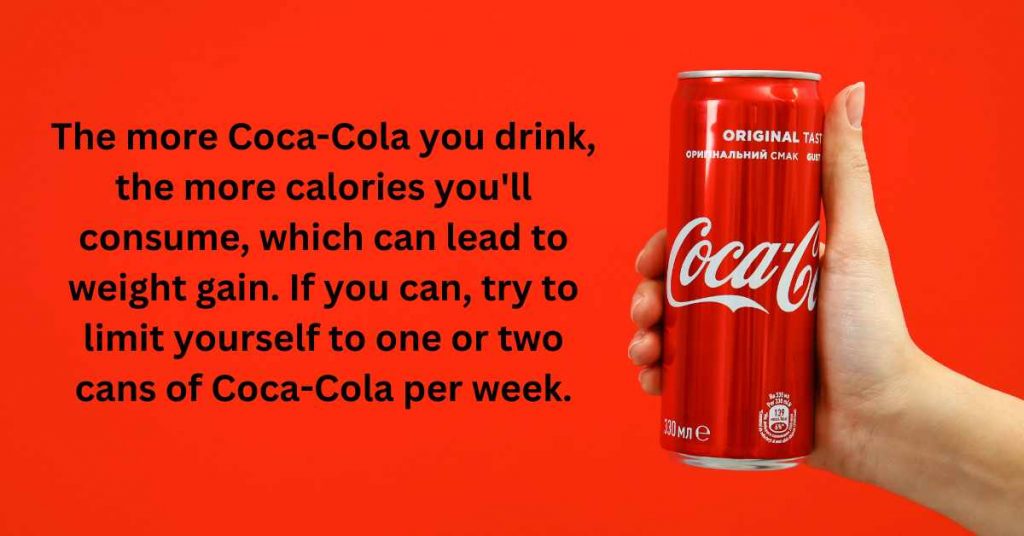Does Coke Zero Cause Weight Gain? Scientific Analysis

Does Coke Zero Cause Weight Gain? Coke Zero, a sugar-free alternative to regular Coca-Cola, is a zero-calorie beverage sweetened with artificial sweeteners like aspartame and acesulfame potassium. While some individuals claim that it causes weight gain, scientific evidence does not support a direct link between consuming Coke Zero in moderation and weight gain. Weight management is a complex process influenced by various factors, and individual responses to artificial sweeteners may vary. Studies suggest replacing high-calorie sugary drinks with Coke Zero or other no-calorie alternatives can benefit weight management combined with a balanced diet and regular physical activity. As with any dietary choice, moderation and overall lifestyle habits play a key role in maintaining a healthy weight.
Recently, there has been a growing concern about the potential health effects of artificially sweetened beverages. Among these, Coke Zero, a popular sugar-free alternative to regular Coca-Cola, has faced its fair share of scrutiny. Some claim that Coke Zero causes weight gain despite being marketed as a zero-calorie drink. In this article, we delve into the controversy surrounding Coke Zero and its alleged impact on weight, considering scientific evidence, personal experiences, and lifestyle factors.

- What is Coke Zero?
- The Controversy Surrounding Artificial Sweeteners
- Understanding Weight Gain
- Coke Zero and Weight Gain: The Scientific Perspective
- Reasons Why Coke Zero Might Cause Weight Gain
- Research And Study
- Personal Testimonies and Anecdotal Evidence
- Lifestyle Factors and Weight Gain
- Moderation and Balance: The Key to Healthy Weight Management
- Tips to Avoid Weight Gain
- Keep in mind about Coke Zero
- Bottom Line
- FAQs
What is Coke Zero?
Before we explore the weight gain issue, let's first understand what Coke Zero is. Launched as a sugar-free alternative to regular Coca-Cola in 2005, Coke Zero offers a similar taste without the added sugar and calories. Instead, it contains artificial sweeteners, primarily aspartame, and acesulfame potassium, to deliver the familiar Coca-Cola flavor without the guilt of excess calories.
The Controversy Surrounding Artificial Sweeteners
Artificial sweeteners, including aspartame, used in Coke Zero, have been controversial for years. Some studies suggest potential health concerns related to these sweeteners, raising questions about their safety and effects on the body.
Aspartame and Health Concerns
Aspartame, one of the key sweeteners in Coke Zero, has been linked to various health concerns in some studies. These concerns range from headaches and digestive issues to more severe conditions. However, it's essential to note that regulatory agencies like the FDA and EFSA have deemed aspartame safe for consumption within recommended daily limits. Read to learn 'Does Coke Zero Cause Headaches.'
Studies on Coke Zero and Weight Gain
The notion that Coke Zero might lead to weight gain stems from studies that suggest artificial sweeteners could interfere with the body's natural mechanisms for weight regulation. Some researchers propose that these sweeteners might affect insulin levels, increasing hunger and potential fat storage.
Understanding Weight Gain
To better comprehend the connection between Coke Zero and weight gain, it's crucial to understand how weight gain occurs in the body.
Calories and Weight Gain
Weight gain generally occurs when there is a calorie surplus, meaning the body consumes more calories than it burns for energy. In this context, Coke Zero, a zero-calorie beverage, would not contribute to a caloric surplus.
Insulin and Fat Storage
However, some studies suggest that artificial sweeteners increase insulin secretion in response to the sweet taste, even without the calories. Insulin is a hormone that regulates blood sugar levels and can also influence fat storage. Higher insulin levels increase hunger and potentially more fat stored in the body.
Coke Zero and Weight Gain: The Scientific Perspective
Numerous research studies have investigated the potential effects of Coke Zero and other artificially sweetened beverages on weight management.
Research Studies on Coke Zero
Most scientific studies have not found a direct link between Coke Zero consumption and weight gain. These studies have shown that, on its own, Coke Zero does not contribute to weight gain when consumed in moderation as part of a balanced diet.
Low-Calorie and No-Calorie Beverages in Weight Management
Research suggests that low-calorie and no-calorie beverages like Coke Zero can be valuable tools for weight management. By replacing high-calorie beverages with zero-calorie alternatives, individuals can reduce their overall caloric intake and potentially aid weight loss efforts.

Reasons Why Coke Zero Might Cause Weight Gain
Here are some of the potential reasons why Coke Zero might cause weight gain:
Artificial sweeteners: Artificial sweeteners have been shown to increase appetite in some people. This is because artificial sweeteners can trick the body into thinking it is consuming sugar, leading to overeating.
Coke Zero may disrupt the gut microbiome: The gut microbiome is a complex ecosystem of bacteria that plays an essential role in digestion, metabolism, and immunity. Disruption of the gut microbiome could lead to weight gain. Read to learn about 'Does Coke Zero affect your metabolism.'
Coke Zero may alter how the body processes calories: Some studies have shown that artificial sweeteners can change how the body processes calories, which could lead to weight gain.
It is important to note that only some people who drink Coke Zero gain weight. If you are concerned about whether Coke Zero might be causing you to gain weight, it is best to speak to your doctor. They can help you assess your risk and recommend whether Coke Zero is a safe choice for you.
Research And Study
Here are some research and study information:
- A study published in the journal "Obesity" found that people who drank diet soda were more likely to gain weight over time than those who did not.
- Another study published in the journal "Nature," found that artificial sweeteners can alter the way the body processes calories, which could lead to weight gain.
- However, other studies have not found a link between Coke Zero and weight gain. For example, one study published in the journal "Nutrition Reviews" found no difference in the incidence of weight gain between people who drank diet soda and those who did not drink diet soda.
So, what does all of this mean? It is still unclear whether Coke Zero causes weight gain. More research is needed to determine the link between Coke Zero and weight gain.
If you are concerned about whether Coke Zero may be causing you to gain weight, it is best to speak to your doctor. They can help you assess your risk and recommend whether Coke Zero is a safe choice for you.
Personal Testimonies and Anecdotal Evidence
While scientific evidence provides valuable insights, personal experiences and anecdotal evidence should be considered. Individuals' responses to artificial sweeteners can vary, and some people may find that consuming Coke Zero or other similar beverages triggers cravings for sweet or high-calorie foods, leading to overeating and, subsequently, weight gain.
Lifestyle Factors and Weight Gain
It's essential to recognize that weight management is influenced by a combination of factors, not solely the consumption of a particular beverage. Lifestyle factors such as diet, physical activity, sleep patterns, and stress levels significantly influence weight regulation.
Moderation and Balance: The Key to Healthy Weight Management
Rather than singling out one specific beverage as the cause of weight gain, focusing on overall dietary habits and lifestyle choices is essential. Incorporating Coke Zero or other artificially sweetened beverages into a balanced diet in moderation is unlikely to cause weight gain.
Tips to Avoid Weight Gain
Here are some additional tips to help you avoid weight gain from Coke Zero:
- Drink Coke Zero in moderation. One or two cans per day will probably not cause any problems.
- Avoid drinking Coke Zero on an empty stomach. This will help to prevent your stomach from becoming too full of gas.
- Pair Coke Zero with foods that are high in fiber. Fiber can help to absorb gas and to avoid bloating.
- If you experience weight gain after drinking Coke Zero, try reducing your intake or switching to a different beverage.
Keep in mind about Coke Zero
Here are some other things to keep in mind about Coke Zero:
- Coke Zero is a low-calorie beverage, but it is not calorie-free. It contains about 34 calories per 12-ounce can.
- Coke Zero is sweetened with artificial sweeteners. These sweeteners are safe for most people, but some may be concerned about their long-term effects.
- Coke Zero is a carbonated beverage. Carbonated beverages can cause bloating and gas in some people.
Ultimately, whether or not to drink Coke Zero is a personal decision. If you are concerned about the potential effects of Coke Zero on your health, it is best to speak to your doctor.
Bottom Line
In conclusion, whether Coke Zero causes weight gain remains a topic of debate. While some studies suggest potential concerns related to artificial sweeteners, most research does not support a direct link between Coke Zero and weight gain. Weight management is a complex process influenced by various factors, and individual responses to artificial sweeteners may vary. In the end, moderation and balance are key. If you enjoy the taste of Coke Zero or similar beverages, incorporating them into a well-rounded diet and active lifestyle should not be a cause for concern.
FAQs
Is Coke Zero calorie-free?
Coke Zero is a calorie-free beverage sweetened with artificial sweeteners like aspartame and acesulfame potassium.
Does Coke Zero contain any sugar?
No, Coke Zero does not contain any sugar. It is sweetened with artificial sweeteners to provide a similar taste to regular Coca-Cola without the added calories.
Can drinking Coke Zero lead to weight gain?
Scientific evidence suggests that consuming Coke Zero in moderation will unlikely cause weight gain. Weight management depends on various factors, including overall diet and lifestyle choices.
Are artificial sweeteners safe to consume?
Regulatory agencies like the FDA and EFSA have deemed artificial sweeteners safe for consumption within recommended daily limits. However, some studies have raised concerns, and individual responses may vary.
Can replace sugary drinks with Coke Zero help with weight management?
Replacing high-calorie sugary beverages with Coke Zero or other no-calorie options can reduce overall caloric intake and potentially aid weight management combined with a balanced diet and regular physical activity.

Recommendation